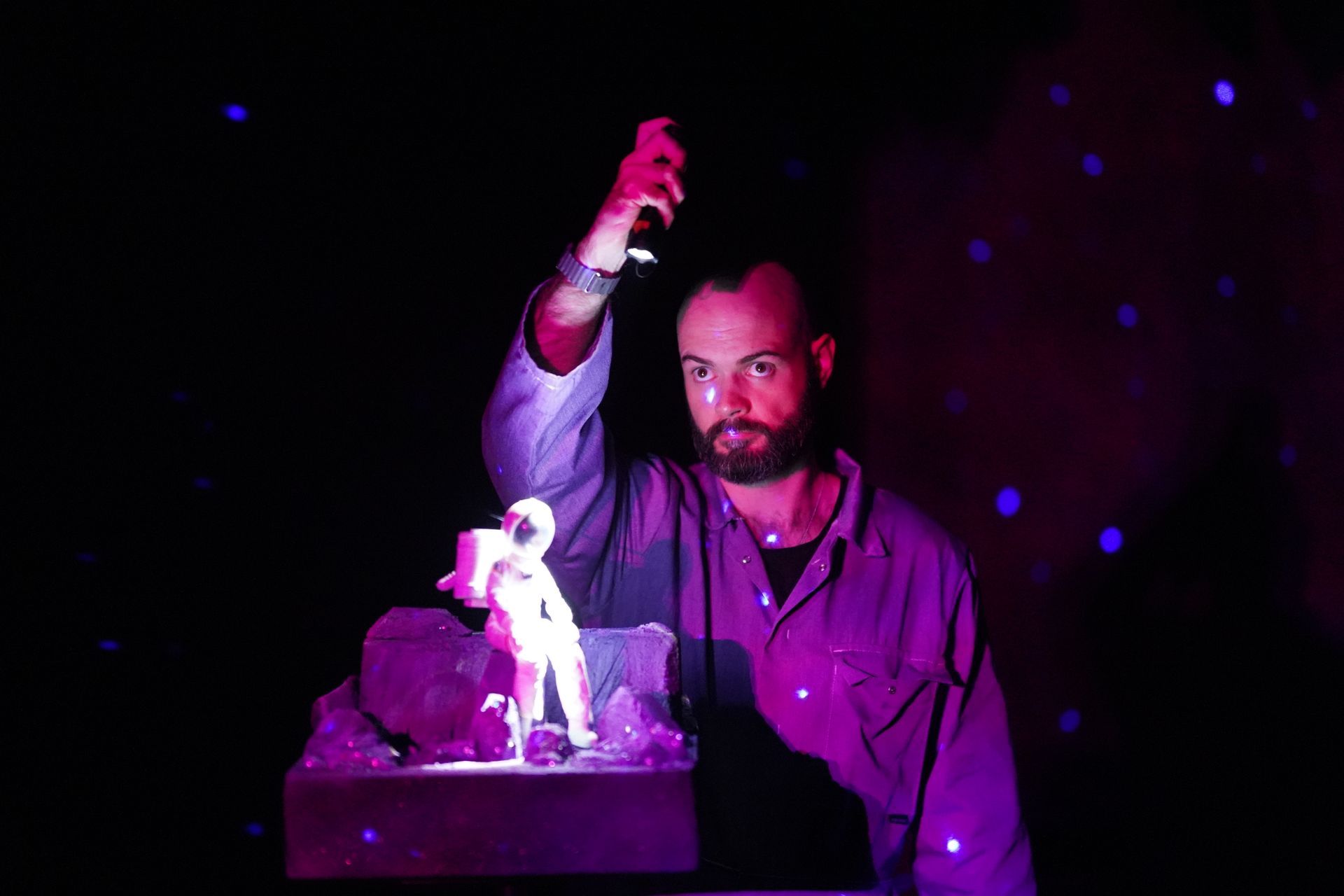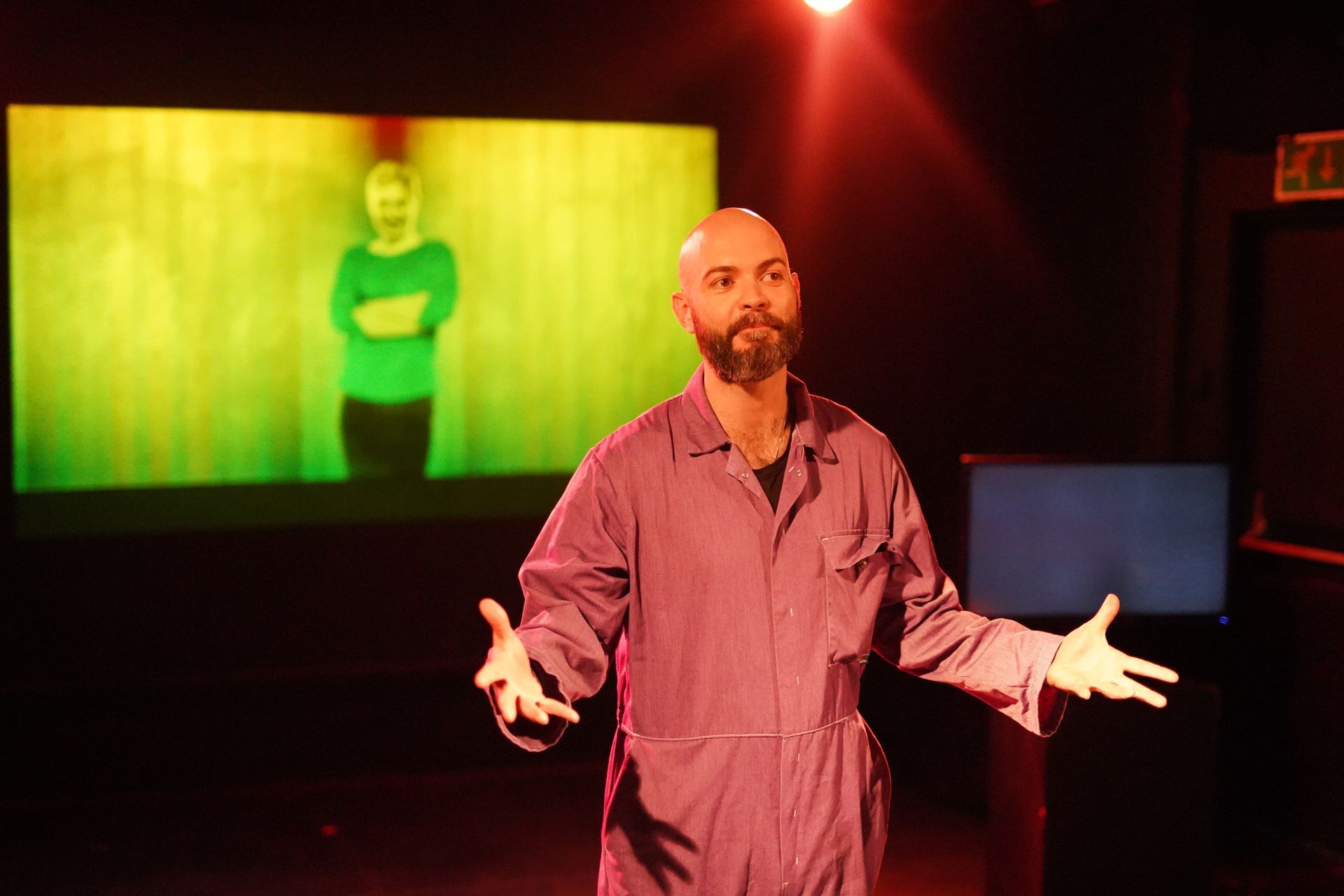What's the story?
An isolated tech mogul tries to turn love into an algorithm. A jaded consumer confronts their loneliness. An astronaut is trapped in the cosmos. Distant Memories of the Near Future is a piece of multimedia storytelling-theatre featuring projection, video, audio and puppetry to tell five interweaving tales about love, technology and artificial intelligence.
What attracted you to the show in the first place?
When I read Distant Memories of the Near Future for the first time, I was so struck by the relationship and contrast it offered between technology and humanity. I was interested in how to bring these opposites to life, while keeping the very heart of the piece alive – love. It’s a tender, gentle piece about connection and loneliness, with an extremely healthy dollop of humour and satire, all set in a future not too dissimilar to our own. I knew that working on the piece would be both fun and challenging.

I had worked with David on his previous show, a beautifully written piece called UNWANTED OBJECTS written and performed with Matt Glover. The two of them had taken the show up to Edinburgh without a director and wanted to take their work to the next level, working with an outside eye for the first time. I loved that script, and I think that for David seeing work he had made in the hands of someone else’s creative vision was a new and exciting experience. When he asked me to meet him at the NT and pitched me the idea for DISTANT MEMORIES. I was excited by the idea of bringing a brand new piece to life, and to work together to craft what our version of Storytelling Theatre would be for it. I also knew I would be challenged by the technical aspect of the show, and directing an AI generated character sounded like a unique opportunity. I am always attracted to working with great people and great writing, telling stories that deserve to be heard and interrogating the human experience, while also finding opportunities for me to grow professionally. Distant Memories does all of that.
What were the early days at Rosemary Branch like?
David and I worked closely as a pair to take this show from the page to the stage. Given that I had worked with him before, he really trusted me with his work and I felt able to build worlds within worlds and, importantly, have fun! When I came into the room with - let’s face it - some wacky ideas, David was game for all of them. It’s been so beautiful to see our ideas bloom into a fully formed show. Our performances at the Rosemary Branch were both packed and (I may be biased, but) that room feels truly magical when it is full of an audience leaning in to listen and throwing their heads back to laugh. They loved it, and it was just what we needed before embarking on a month in Edinburgh.
Any show has its low points in the creation process, and ours occurred mainly around the production elements of the show; trying to pull together a great deal of tech to work seamlessly and invisibly on stage was a steep learning curve for us both. When David’s laptop, with all of the tech for the show loaded into it, failed to turn on the day before we opened our Edinburgh run it was definitely…memorable! But, like everything else with this show, we have worked together to work through it. These moments show you the strength of your team. Improvise, adapt, overcome!
How did the next phase come about?
We knew we wanted to stage the piece again - we had put so much heart into it and the reception had been incredible - but we didn’t want to rush it; we have had some great learning in tandem with the creation process around how we want to work and why. One of these learnings has been balancing our health with the health of the Art, which happens so rarely in fringe theatre with the limited resources available.
We had an offer from Bloomsbury to publish the play should we do another run which we wanted to make the most of if we could - a goal of David’s from our initial meeting at the NT was to get published. When the offer came from Leyla at the Arcola it felt like the perfect moment to revisit the piece. Plus, the Arcola is a bucket list venue for me; I’m so delighted to be bringing a piece of my work there.


What had to change?
Working on storytelling theatre, and defining what we want our piece of storytelling theatre to be, has been such an interesting exploration during this process. In this 2024 iteration, I have been experimenting and questioning how much of the story is being told by the performer, the narrator or the character - how does POV come into play and how can we use it to tell these stories in a way that best serves the writing, and with as much clarity as possible. I’ve also had a lot of fun working with David as an actor, challenging him to go a step further and deeper with emotional connection, and balancing that with his history of stand up comedy.
In our first version of this show the adverts, which are a key tool in our satirisation of consumerism but also in weaving together the individual stories of the piece, were audio. We have worked with a brilliant designer, Katya Shipulina, to animate these adverts to fantastic effect - they help to more clearly delineate the worlds we are building but they also introduce so much humour. We are all bombarded by visual advertising every day, I think the animations will help the spectator to identify this ‘near future’ as not so far from our present in many ways.
Where are you now with it?
We feel in a solid place with the show. We took a brilliant version of it to Edinburgh in 2023 that received so much positive feedback - the work is good, and sometimes the worst thing you can do is take something that works and drown it in bells and whistles so you can no longer hear it sing. There is a lot of tech in this show (as one would assume with an AI generated character!) and so in these last weeks before we open it is mainly about us lining up our digital ducks to make sure they stay in a row for us.
What do you hope to achieve?
Distant Memories loudly rings the bell of the importance of human connection. We are not alone, and the piece reminds us that everyone is bright and brilliant in their own way - and even in the moments where we don’t feel bright and brilliant, we are not alone in that experience. I hope the piece will be uplifting, entertaining and a timely reminder that small kindnesses can go a long way, with their ripple effects felt in unexpected ways. Love can be profound, but it can also be an act of gentle anarchy against the machines at work around us.
Laura Killeen is Artistic Director of Rosemary Branch Theatre
Distant Memories of the Near Future, Written & Performed by David Head is at Arcola Theatre 12 – 30 November.






